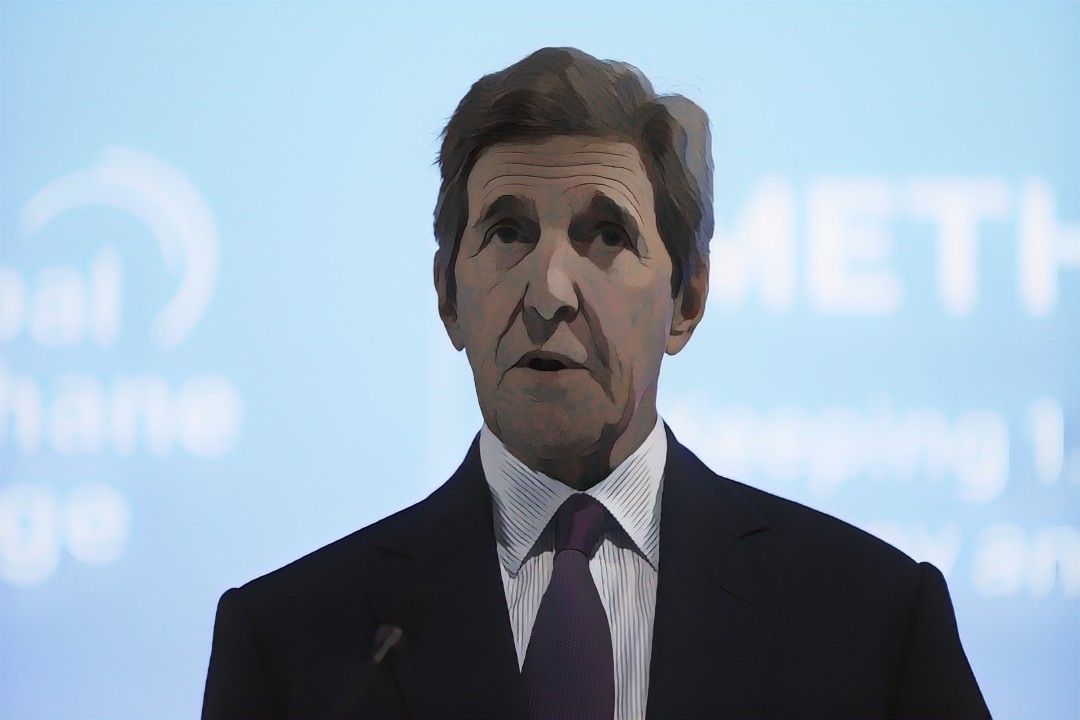No Breakthrough from Climate Envoy John Kerry's China Trip

The Lede: U.S. climate envoy John Kerry concluded his four-day visit to Beijing on Wednesday without reaching any new climate agreements, but the visit marked another important set of high-level meetings between the two countries
What We Know:
- Kerry arrived in China with the intention to make progress on climate issues including reducing methane emissions and speeding up China’s transition from coal.
- The U.S. climate envoy met with his Chinese counterpart special envoy Xie Zhenhua, Chinese vice president Han Zheng, and China’s top diplomat Wang Yi. The rest of his time was spent directly in conferences with Chinese climate negotiators. Despite the high-level conversations, no concrete agreements were reached but the two sides committed to regular conversations in the near future. There was agreement on keeping global average temperatures from rising more than 1.5 degrees Celsius from pre-industrial levels. The planet has already reached 1.2 degrees from that level.
- During Kerry’s visit, Chinese President Xi Jinping made separate remarks at a national conference on ecological and environmental protection suggesting that China’s climate policies should be determined by itself over the sway of outside influence. Kerry responded to those remarks by clarifying that the U.S. is not attempting to dictate or compel China, but that science should inform policy.
The Background: The U.S. and China are the world’s two biggest carbon polluters and economies. The U.S. generates 14 percent of global carbon emissions while China generates 31 percent. China has constructed many new coal-fired plants in recent years and has been steadily extracting oil, gas, and coal. It has also built more solar, wind, and other renewable energy infrastructure than all other countries combined. Both countries, and the world in general, have been experiencing record-breaking heat waves, floods, and extreme weather patterns. The climate issue sits in the context of the U.S. and China reaching a low point in bilateral relations and a string of several high-level meetings between officials from both sides in recent months including visits to Beijing by Secretary of State Antony Blinken and Secretary of the Treasury Janet Yellen.
Likely Outcomes:
- Kerry’s meetings could mark a crucial first step in restoring more open channels to U.S.-China climate communications and perhaps for overall bilateral dialogue. Future meetings of this level and depth to seek cooperation in other areas will likely take place as the two countries reposition themselves toward building diplomatic trust and strategic understanding to clear away the uncertainty in current relations.
- While each country will likely continue its own interests in climate policy in accordance with energy needs, understanding the counterpart’s perspective will help the U.S. and China identify areas where interests align and where hard agreements can actually materialize. Until those alignments occur, however, agreement between the two on climate issues may continue to be elusive. That holds true for all areas where the U.S. and China currently differ.
Quotables:
“We had a very extensive set of frank conversations and realized that it’s going to take a little bit more work to break the new ground. So we’ve agreed that we’re going to meet intensively…The conversations we had with the leadership were clear about some of their concerns with respect to security and the marketplace and some of the tensions that are existing between the United States on some other issues.” – John Kerry, U.S. climate envoy
“The pathway and means for reaching this goal, and the tempo and intensity, should be and must be determined by ourselves, and never under the sway of others.” – Xi Jinping, president of China
"We all understand the difficult situation for John Kerry. He is passionate on climate, just like his counterpart, Special Envoy Xie, but in America, climate collaboration has been affected by local politics and that does make it quite difficult." – Ma Jun, director of the Institute of Environment and Public Affairs
“Kerry returning from his China trip with nothing from the [Chinese Communist Party] beyond plans for future talks is just another example of how this administration has no China strategy. Diplomacy can be effective but not from a position of weakness — the administration must have clear goals and asks when it comes to China.” – Michael McCaul, Republican Congressman from Texas and chair of the House Foreign Affairs Committee
“Normal climate diplomacy between the U.S. and China is back on track — that’s essential for progress at COP28 and meeting the challenge of climate change more broadly.” – David Sandalow, former senior official at the Department of Energy during the Obama administration
“To do something big will need a vetting process done within the two sides’ governments, because by definition, if it’s big, it’s going to have to be thought through in a more careful way than just a three-day meeting.” – Nate Hultman, director of the University of Maryland’s Center for Global Sustainability and former senior adviser to John Kerry
Good Reads:
Kerry’s trip to China yields no breakthrough on climate (Politico)
US-China climate talks brought goodwill, modest progress (Reuters)
China’s Xi Rebuffs Kerry’s Call for Faster Climate Action (NYT)
